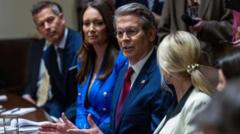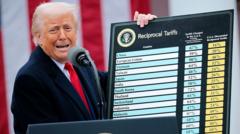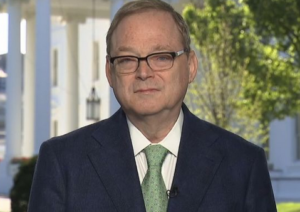Despite economic challenges, China showcases strength and resilience in the face of US aggression.
**China's Stance: Resolute Resistance to US Tariffs**

**China's Stance: Resolute Resistance to US Tariffs**
In the ongoing trade conflict, Beijing stands firm against US tariff pressures, asserting its strategy.
In an unyielding stance against the US, Chinese officials emphasize that they have no intention of succumbing to the tariff pressures exerted by the Trump administration. They regard US tactics as bullying, asserting that China possesses the unique capacity to endure such challenges far better than any other nation. Before the onset of the tariff war, sales to the US constituted merely 2% of China's GDP, illustrating that the country enjoys a significant buffer against potential economic fallout.
Although Beijing would prefer to avoid a prolonged trade war, especially amid ongoing economic issues—such as a real estate slump, regional debt concerns, and high youth unemployment—the Chinese government has conveyed a narrative of strength to its citizens. Despite facing purported economic dangers, officials maintain that their tariffs can inflict reciprocal damage on American exporters.
President Trump has communicated to his supporters the notion that he could easily bend China to his will through tariffs. However, the results indicate otherwise, as Beijing remains resolute. In recent discussions with Spanish Prime Minister Pedro Sanchez, Chinese leader Xi Jinping reinforced the idea that the EU should ally with China against the unilateral actions of the US. This meeting occurred in the context of fresh tariff hikes by Beijing, although officials signaled hesitancy to counter further US tariff increases.
As Xi prepares to visit Malaysia, Vietnam, and Cambodia—all nations adversely affected by US trade measures—he is accompanied by economic dialogue with countries such as South Africa and India, highlighting potential avenues for enhanced trade. Discussions are also underway concerning the removal of European tariffs on Chinese automobiles, with proposals for a minimum pricing strategy to avert dumping crises.
In essence, the escalating tit-for-tat tariff strategies between the US and China are losing their substance, transforming into acts of symbolism rather than effective economic policy. Recent statements from the Chinese Foreign Ministry, including an evocation of Chairman Mao's defiance from the Korean War era, underscore the seriousness of China's resolve. The message is clear: "We are Chinese. We are not afraid of provocations. We won’t back down." As the trade conflict unfolds, the question remains—have Trump's tariff objectives been realized in any meaningful way?
Although Beijing would prefer to avoid a prolonged trade war, especially amid ongoing economic issues—such as a real estate slump, regional debt concerns, and high youth unemployment—the Chinese government has conveyed a narrative of strength to its citizens. Despite facing purported economic dangers, officials maintain that their tariffs can inflict reciprocal damage on American exporters.
President Trump has communicated to his supporters the notion that he could easily bend China to his will through tariffs. However, the results indicate otherwise, as Beijing remains resolute. In recent discussions with Spanish Prime Minister Pedro Sanchez, Chinese leader Xi Jinping reinforced the idea that the EU should ally with China against the unilateral actions of the US. This meeting occurred in the context of fresh tariff hikes by Beijing, although officials signaled hesitancy to counter further US tariff increases.
As Xi prepares to visit Malaysia, Vietnam, and Cambodia—all nations adversely affected by US trade measures—he is accompanied by economic dialogue with countries such as South Africa and India, highlighting potential avenues for enhanced trade. Discussions are also underway concerning the removal of European tariffs on Chinese automobiles, with proposals for a minimum pricing strategy to avert dumping crises.
In essence, the escalating tit-for-tat tariff strategies between the US and China are losing their substance, transforming into acts of symbolism rather than effective economic policy. Recent statements from the Chinese Foreign Ministry, including an evocation of Chairman Mao's defiance from the Korean War era, underscore the seriousness of China's resolve. The message is clear: "We are Chinese. We are not afraid of provocations. We won’t back down." As the trade conflict unfolds, the question remains—have Trump's tariff objectives been realized in any meaningful way?























